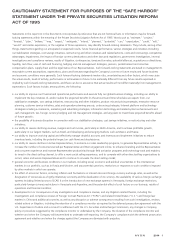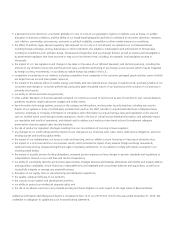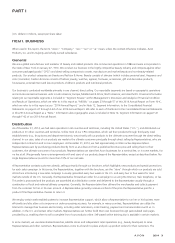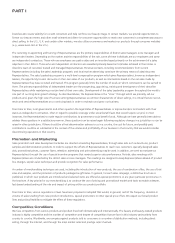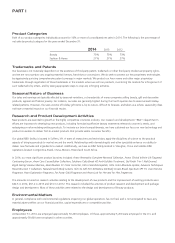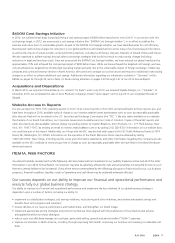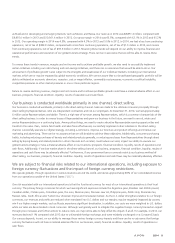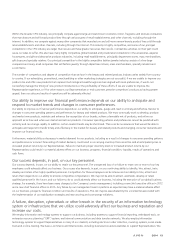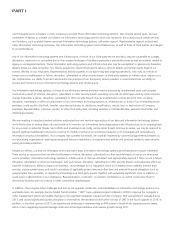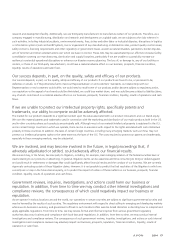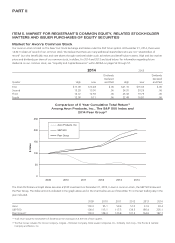Avon 2014 Annual Report Download - page 19
Download and view the complete annual report
Please find page 19 of the 2014 Avon annual report below. You can navigate through the pages in the report by either clicking on the pages listed below, or by using the keyword search tool below to find specific information within the annual report.If we commit a breach of the DPA, we may be subject to criminal prosecution. Such criminal
prosecution could have a material adverse effect on our business, financial condition, results
of operations or cash flows.
Under the DPA, the DOJ will defer criminal prosecution of the Company for a term of three years in connection with the charged violations
of the FCPA. If the DOJ determines that the Company has knowingly violated the DPA (including the monitoring provisions described in the
preceding risk factor), the DOJ may commence prosecution or extend the term of the DPA for up to one year. If the Company remains in
compliance with the DPA through its term, the charges against the Company will be dismissed with prejudice.
Failure to comply with the terms of the DPA could result in criminal prosecution by the DOJ, including for the charged violations of the
books and records and internal controls provisions of the FCPA that were included in the information that was filed in connection with the
DPA. Under such circumstance, the DOJ would be permitted to rely upon the admissions we made in the DPA and would benefit from our
waiver of certain procedural and evidentiary defenses. Such a criminal prosecution could subject us to penalties that could have a material
adverse effect on our business, financial condition, results of operations or cash flows.
A general economic downturn, a recession globally or in one or more of our geographic
regions or markets, such as Russia, or sudden disruption in business conditions or other
challenges may adversely affect our business, our access to liquidity and capital, and our
credit ratings.
Current global macro-economic instability or a further downturn in the economies in which we sell our products, including any recession in
one or more of our geographic regions or markets, such as Russia, could adversely affect our business, our access to liquidity and capital,
and our credit ratings. Global economic events over the past few years, including high unemployment levels, the tightening of credit markets
and failures of financial institutions and other entities, have resulted in challenges to our business and a heightened concern regarding
further deterioration globally. In addition, as mentioned above, our business is conducted primarily in the direct-selling channel. We could
experience declines in revenues, profitability and cash flow due to reduced orders, payment delays, supply chain disruptions or other factors
caused by such economic, operational or business challenges. Any or all of these factors could potentially have a material adverse effect on
our liquidity and capital resources and credit ratings, including our ability to access short-term financing, raise additional capital, reduce
flexibility with respect to working capital, and maintain credit lines and offshore cash balances.
Consumer spending is also generally affected by a number of factors, including general economic conditions, inflation, interest rates, energy
costs, gasoline prices and consumer confidence generally, all of which are beyond our control. Consumer purchases of discretionary items,
such as beauty and related products, tend to decline during recessionary periods, when disposable income is lower, and may impact sales of
our products. We may face continued economic challenges in fiscal 2015 because customers may continue to have less money for
discretionary purchases as a result of job losses, bankruptcies, reduced access to credit and weakness in housing, among other things.
In addition, sudden disruptions in business conditions and consumer spending may result from acts of terror, natural disasters, adverse
weather conditions, such as the significant typhoon which impacted the Philippines in 2013, and pandemic situations or large scale power
outages, none of which are under our control.
Our credit ratings were downgraded in 2014, which could limit our access to financing, affect
the market price of our financing, and increase financing costs. A further downgrade in our
credit ratings may adversely affect our access to liquidity, and our working capital.
Nationally recognized credit rating organizations have issued credit ratings relating to our long-term debt. In 2014, our credit ratings were
downgraded. Our current long-term credit ratings are Ba1 (Stable Outlook) with Moody’s, BB+ (Stable Outlook) with S&P, and BB (Negative
Outlook) with Fitch, which are below investment grade. Additional rating agency reviews could result in a further change in outlook or
downgrade. Our credit ratings could limit our access to new financing, particularly short-term financing; reduce our flexibility with respect to
working capital needs; adversely affect the market price of some or all of our outstanding debt securities; result in an increase in financing
costs, including interest expense under certain of our debt instruments; and result in less favorable covenants and financial terms of our
financing arrangements. For example, as of December 31, 2014, we have approximately $122 million outstanding in short-term borrowings
of our international subsidiaries. A further change in outlook or downgrade of our credit ratings may increase some of these risks and limit
our access to such short-term financing in the future on favorable terms, if at all. See Note 5, Debt and Other Financing, on pages F-17
through F-20 of our 2014 Annual Report for details about the terms of our existing debt and other financing arrangements.
A V O N 2014 11


